Analyzing the Hall of Fame cases of Manny Ramirez, Omar Vizquel, Kenny Lofton
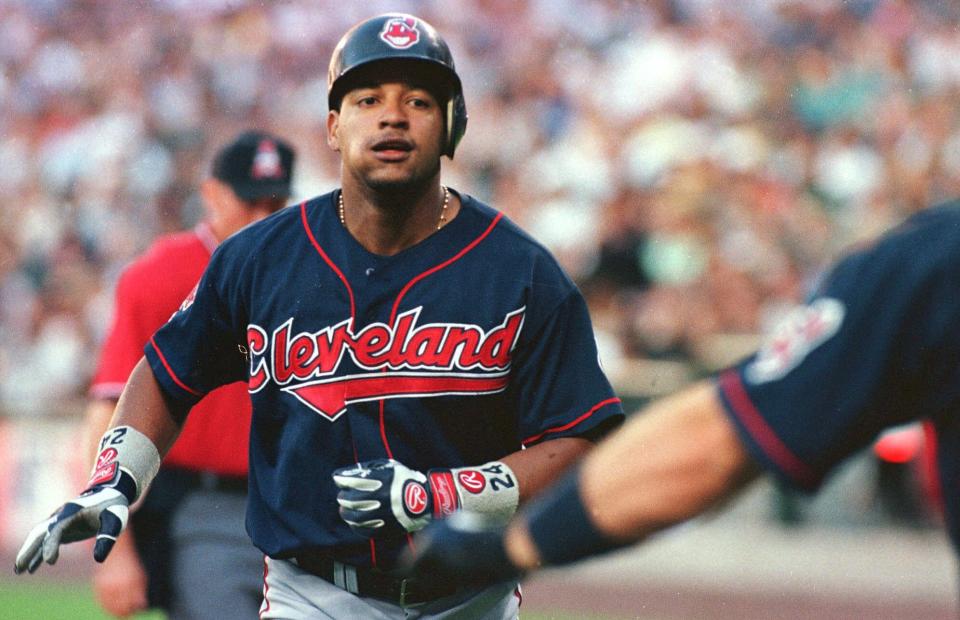
Three of Cleveland's key players from the teams of the 1990s continue to lose momentum when it comes to their Hall of Fame candidacy and their bid to join Jim Thome in Cooperstown.
Manny Ramirez, Omar Vizquel and Kenny Lofton all hold their places in the memories of Cleveland baseball fans in the '90s for what they did on the field. But in very large part due to performance-enhancing drugs and issues with domestic abuse clouding their case, two of the three have seen their chances of being voted in buried, and a third has had allegations pop up after falling off the ballot altogether.
The 2024 Hall of Fame class was announced this week, with Adrian Beltre, Joe Mauer and Todd Helton earning induction.
Players must earn 75% of the Baseball Writers' Association of America vote to be inducted. Ramirez earned 32.5 percent of the vote, Vizquel had 17.7 and Lofton is still off the ballot entirely.
Here's a look at all three of their cases, and why the Eras Committee, which can consider players no longer on the ballot, is their only chance.
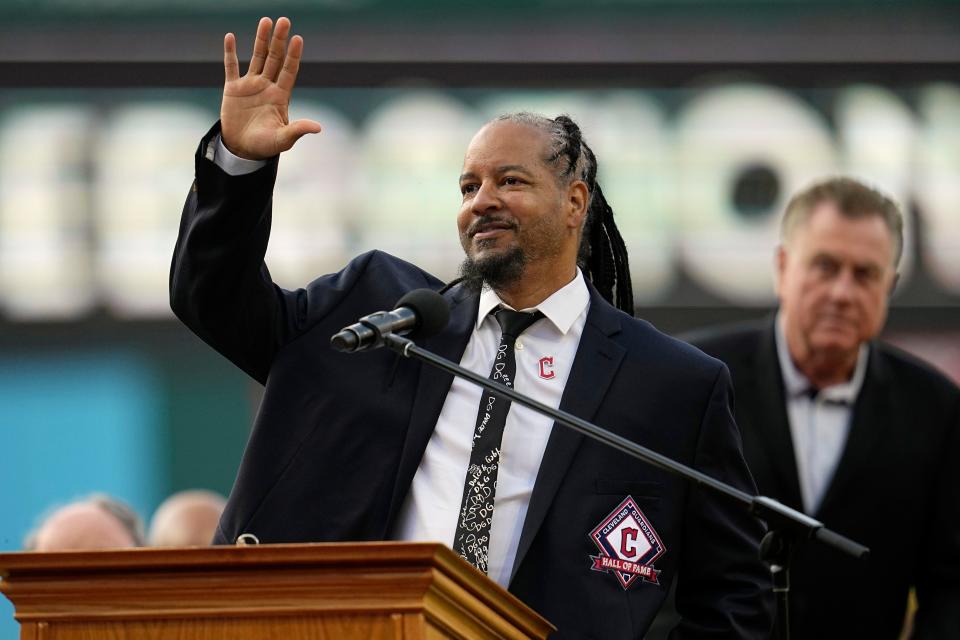
Manny Ramirez Baseball Hall of Fame voting still below 35 percent
Ramirez was always known as one of the most feared right-handed hitters to ever pick up a bat. The word "savant" has been thrown around when describing his artistry at the plate for quite some time.
Based on statistics alone, Ramirez would already have been enshrined in Cooperstown. He finished with 555 home runs, was a 12-time All-Star, ranked in the top-10 in MVP voting eight years in a row and helped lead Cleveland and Boston to two World Series appearances each. He had a career 153 wRC+, which over the last 30 years is ahead of his contemporaries Jeff Bagwell, Edgar Martinez and Frank Thomas.
He was inducted into the Guardians Hall of Fame last year, and reminded all of Cleveland that Manny is still being Manny — the moniker he garnered with a few humorous plays during his career, including the time he for some reason cut off a throw from Johnny Damon or the time he high-fived a fan during a play. But along with the goofiness on the field was a reputation for laser focus and an unmatched work ethic when it came to hitting.
Ramirez finished his career with 69.3 fWAR, ahead of the average Hall of Fame left fielder (65.1). He also has a 54.6 JAWS (Jaffe Wins Above Replacement Score, developed by Jay Jaffe, which measures a player's worthiness for enshrinement), and the average HOF left fielder is at 53.4. By the number, he's in, and probably a first-ballot inductee.
But it isn't all about the numbers. Hall of Fame voters are instructed to consider a number of factors, and voting does include a character clause. The Hall of Fame notes that "a player's record, playing ability, integrity, sportsmanship, character and contributions to the team(s) on which the player played" should all be considered.
There's where Ramirez's multiple suspensions for performance-enhancing drugs comes into play. While most of the Hall of Fame discussion when it comes to PEDs has centered around Barry Bonds, Roger Clemens, Mark McGwire and Sammy Sosa, Ramirez was one of the first stars to gain eligibility who had actual suspensions on his record. And that's plural — suspensions.
Those suspensions, and likely the second one especially, have kept his voting totals down. For the last several years, Ramirez has been hovering around 28 percent of the vote. He received a slight boost this year, as he earned 32.5 percent of the vote.
But all-time hitters like Alex Rodriguez and Ramirez, who were given actual suspensions for PEDs, are still a long way off from receiving the 75 percent of the vote needed for enshrinement.
Ramirez also was involved in a charge of misdemeanor domestic violence and battery in 2011 after his wife told an emergency operator that he had slapped her, though the domestic violence charge was later dropped after his wife refused to testify.
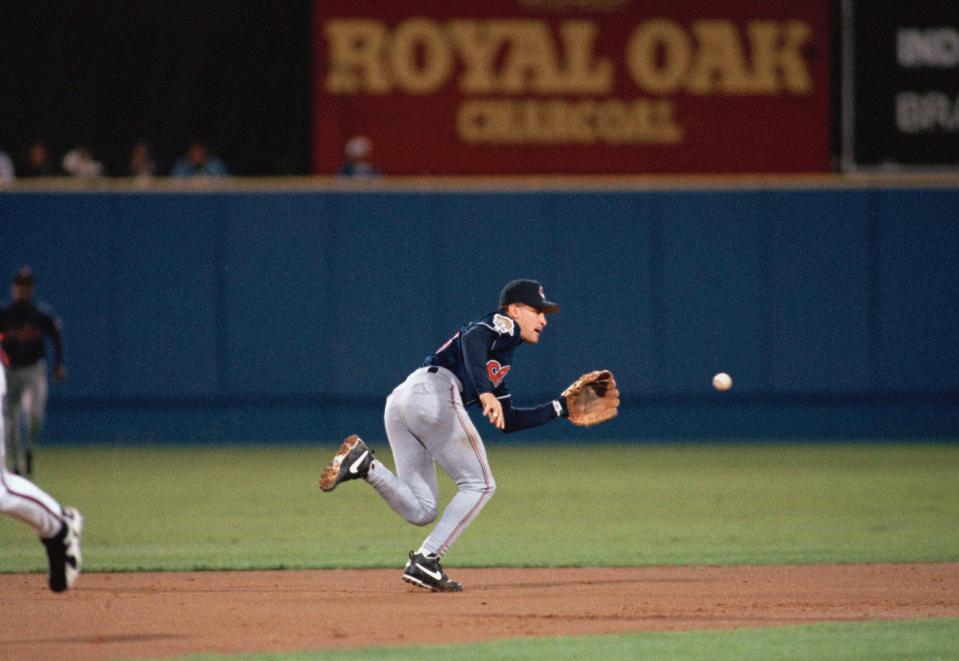
Omar Vizquel Baseball Hall of Fame voting continues dive in 2024
Vizquel might have had a fringe baseball-centric case when he retired, but his alleged actions off the field since that time have led to a free-fall in his chances of being inducted, as evidenced by voting patterns.
In October 2020, Vizquel's second wife, Blanca Garcia, accused him of domestic violence via an Instagram Live post. That accusation led to the unearthing of records pertaining to his January 2016 arrest on charges of fourth-degree domestic assault — Vizquel wasn't prosecuted after she declined to testify.
In August 2021, a former batboy for the Birmingham Barons sued Vizquel for sexual harassment, which allegedly took place in 2019. The batboy, who has autism, alleged that he was "targeted for sexual harassment because of his disability." The lawsuit included a graphic description of the alleged events, including being forced to wash Vizquel's back. An internal investigation led to the team terminating its relationship with Vizquel.
In December 2021, Vizquel issued a statement claiming that the "supposed domestic violence accusations put forth by my now ex Blanca Garcia were disregarded by the judge due to a lack of evidence or any supporting evidence." He also claimed that Garcia "intentionally used my name and my persona in a defamatory manner but that her allegations were ultimately ended and dismissed."
Vizquel spoke with USA Today in December, again saying that things being said "weren't accurate." He went on to say, "My conscience is clean and clear that I'm not the kind of person they are saying about Omar."
On the field, Vizquel was considered by many to be one of the best fielding shortstops of all time. He played 24 MLB seasons, finished with 2,877 hits and won 11 Gold Gloves. He was a three-time All-Star with Cleveland — which is impressive considering the competition at the time included Alex Rodriguez, Derek Jeter and Nomar Garciaparra — and for a few seasons created one of the best defensive middle infield duos ever with Roberto Alomar Jr.
But his baseball-centric resume did have its holes. Vizquel could be an asset in the lineup, but he was never a heavy hitter, finishing with an wRC+ of 83 (100 is average). And while his defense was flashy and full of highlight-reel plays (often bare handed), some defensive metrics point to his play at shortstop not quite being as historically elite. His best season came in 1999, when he hit .333 with a .397 on-base percentage en route to finishing 16th in MVP voting. He never finished in the top-15, which remains one of the on-field blemishes.
Vizquel earned 45.6 career WAR (the number of wins he was worth to his teams above the average replacement player). The average Hall of Fame shortstop has 67.7.
While Vizquel playing 24 seasons is impressive for his consistency, he never had that type of career peak that others did. His seven-year peak WAR of 26.8 is far below the 43.2 of the average HOF shortstop. And his JAWS of 36.2 falls short of the average HOF shortstop's 55.5.
Needing to break the 75-percent threshold, Vizquel's voting hit its height in January 2020, when he earned 52.6 percent of the vote. But it was the only time he ever broke 50 percent. It dropped to 49.1 percent in 2021 and then, after all of the allegations had come to light, took a dive. His voting totals the last three years: 23.9 percent, 19.5 percent and 17.7 percent, respectively.
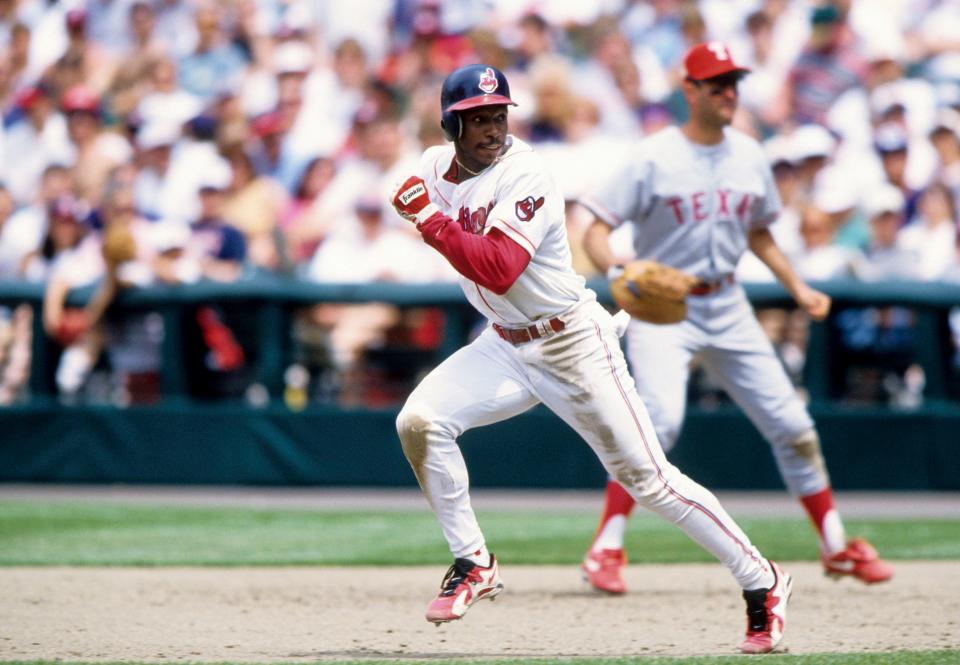
Kenny Lofton Hall of Fame case became a victim of voting rules
Kenny Lofton's Hall of Fame chances were doomed due to timing.
Lofton's first and only year on the ballot came in 2013, in the height of the Bonds/Clemens debates. Voters were split on whether to allow them into the Hall of Fame, and it created a logjam of statistically worthy players. That year featured 10 players who later were inducted, along with Bonds, Clemens, Curt Schilling, McGwire, Sosa and Rafael Palmeiro.
Two Hall of Fame voting rules then came into play. The first is that a voter can only award votes to 10 players each year. With so many worthy players on the ballot at the same time, but unable to garner the needed 75 percent, voters ran out of space on their ballots.
The second rule is that if a player receives less than five percent of the vote, he falls off the ballot for good. Lofton received only 3.2 percent of the vote that year, ending his chances until the Eras Committee could look at his case.
And in terms of his on-field career, Lofton does have a case.
Lofton was one of the best base-stealers of his time, leading the American League five years in a row, and was a four-time Gold Glove winner in center field. His best season came in 1994, when he led the league in hits (160) and steals (60) in only 112 games en route to finishing fourth in MVP voting. He was also named as an All-Star six seasons in a row from 1994-1999.
He finished his career with 68.4 WAR and a 55.9 JAWS, better marks than many outfielders in the HOF already. Lofton wasn't a heavy hitter, similar to Vizquel, but had a career .299 average, a .372 OBP and swiped at least 54 bases six times. The only centerfielders ahead of him in JAWS who aren't in the HOF are Mike Trout, who will be in one day, and Carlos Beltran, who is on the cusp of induction.
Lofton, too, has had some off-field situations arise. In August 2022, he was accused of sexual misconduct after he allegedly sent explicit pictures to a woman on Instagram. A lawsuit was filed by a former employee at an investment firm Lofton co-owns.
Eventually, Ramirez and Vizquel seem destined to run out their 10-year limits on the initial ballot. And with Lofton already off, it'll be up to the Eras Committee in all three cases.
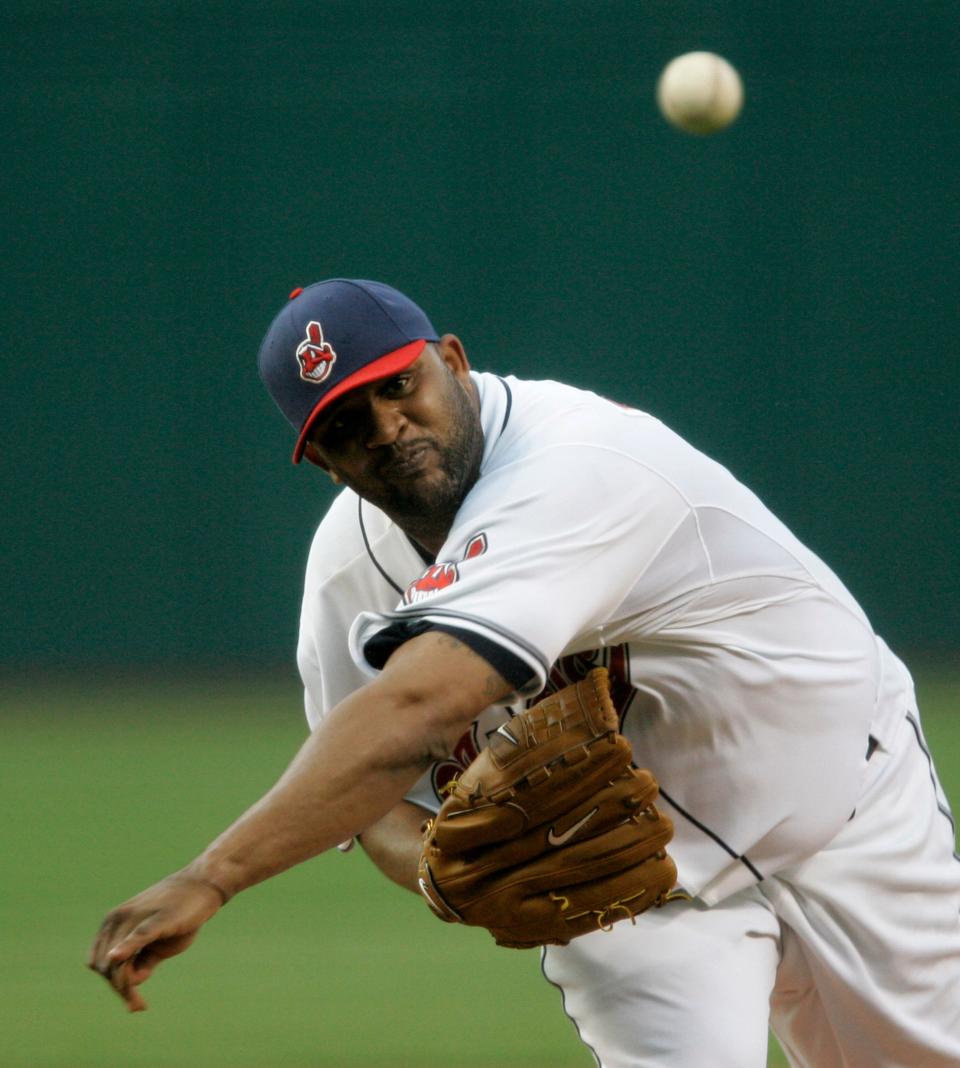
CC Sabathia Baseball Hall of Fame case makes it to ballot in 2025
The 2025 Hall of Fame ballot will include a few notable first-timers, including Ichiro Suzuki and CC Sabathia.
Sabathia won his only Cy Young in 2007 with Cleveland before being traded the next summer to Milwaukee, where he went on a tear for the ages as the Brewers fought for a playoff spot. After spending eight years with Cleveland, he pitched for the Yankees for 11 seasons and finished top four in Cy Young voting three times in a row from 2009-2011.
He has a strong Hall of Fame case, having finished his career with 62.3 WAR and a 50.8 JAWS. Ichiro will surely be a first-ballot Hall of Famer. Time will tell if Sabathia can join him.
Ryan Lewis can be reached at rlewis@thebeaconjournal.com. Read more about the Guardians at www.beaconjournal.com/sports/cleveland-guardians. Follow him on Twitter at @ByRyanLewis.
This article originally appeared on Akron Beacon Journal: Baseball Hall of Fame case: Manny Ramirez, Omar Vizquel, Kenny Lofton

